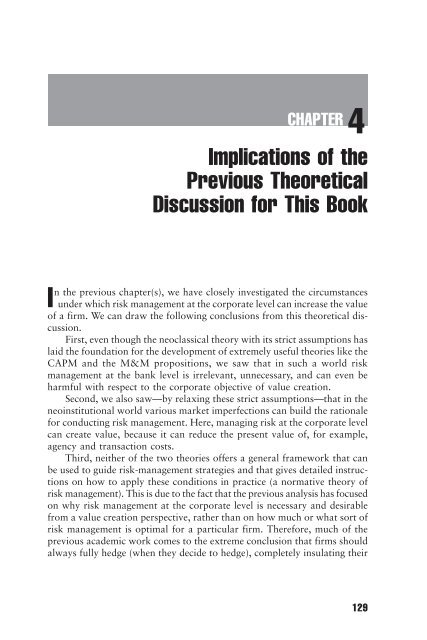- Page 2:
isk management and value creation i
- Page 5 and 6:
Copyright © 2002 by John Wiley & S
- Page 8 and 9:
preface From an empirical as well a
- Page 10:
acknowledgments No book is solely t
- Page 13 and 14:
x CONTENTS Goals of Risk Management
- Page 15 and 16:
xii CONTENTS Definition of RAROC 24
- Page 17 and 18:
xiv FIGURES Figure 5.5 Figure 5.6 F
- Page 19 and 20:
symbols ↑ ↓ α β i xvi Increas
- Page 21 and 22:
xviii SYMBOLS ln Natural logarithm
- Page 23 and 24:
abbreviations APT BIS bn bps CAPM C
- Page 25 and 26:
2 RISK MANAGEMENT AND VALUE CREATIO
- Page 27 and 28:
4 RISK MANAGEMENT AND VALUE CREATIO
- Page 29 and 30:
6 RISK MANAGEMENT AND VALUE CREATIO
- Page 32 and 33:
CHAPTER 2 Foundations for Determini
- Page 34 and 35:
Foundations for Determining the Lin
- Page 36 and 37:
Foundations for Determining the Lin
- Page 38 and 39:
Foundations for Determining the Lin
- Page 40 and 41:
Foundations for Determining the Lin
- Page 42 and 43:
Foundations for Determining the Lin
- Page 44 and 45:
Foundations for Determining the Lin
- Page 46 and 47:
Foundations for Determining the Lin
- Page 48 and 49:
Foundations for Determining the Lin
- Page 50 and 51:
Foundations for Determining the Lin
- Page 52 and 53:
Foundations for Determining the Lin
- Page 54 and 55:
Foundations for Determining the Lin
- Page 56 and 57:
Foundations for Determining the Lin
- Page 58 and 59:
Foundations for Determining the Lin
- Page 60 and 61:
Foundations for Determining the Lin
- Page 62 and 63:
Foundations for Determining the Lin
- Page 64 and 65:
Foundations for Determining the Lin
- Page 66 and 67:
Foundations for Determining the Lin
- Page 68 and 69:
Foundations for Determining the Lin
- Page 70 and 71:
Foundations for Determining the Lin
- Page 72 and 73:
Foundations for Determining the Lin
- Page 74 and 75:
Foundations for Determining the Lin
- Page 76:
Foundations for Determining the Lin
- Page 79 and 80:
56 RISK MANAGEMENT AND VALUE CREATI
- Page 81 and 82:
58 RISK MANAGEMENT AND VALUE CREATI
- Page 83 and 84:
60 RISK MANAGEMENT AND VALUE CREATI
- Page 85 and 86:
62 RISK MANAGEMENT AND VALUE CREATI
- Page 87 and 88:
64 RISK MANAGEMENT AND VALUE CREATI
- Page 89 and 90:
66 RISK MANAGEMENT AND VALUE CREATI
- Page 91 and 92:
68 RISK MANAGEMENT AND VALUE CREATI
- Page 93 and 94:
70 RISK MANAGEMENT AND VALUE CREATI
- Page 95 and 96:
72 RISK MANAGEMENT AND VALUE CREATI
- Page 97 and 98:
74 RISK MANAGEMENT AND VALUE CREATI
- Page 99 and 100:
76 RISK MANAGEMENT AND VALUE CREATI
- Page 101 and 102: 78 RISK MANAGEMENT AND VALUE CREATI
- Page 103 and 104: 80 RISK MANAGEMENT AND VALUE CREATI
- Page 105 and 106: 82 RISK MANAGEMENT AND VALUE CREATI
- Page 107 and 108: 84 RISK MANAGEMENT AND VALUE CREATI
- Page 109 and 110: 86 RISK MANAGEMENT AND VALUE CREATI
- Page 111 and 112: 88 RISK MANAGEMENT AND VALUE CREATI
- Page 113 and 114: 90 RISK MANAGEMENT AND VALUE CREATI
- Page 115 and 116: 92 RISK MANAGEMENT AND VALUE CREATI
- Page 117 and 118: 94 RISK MANAGEMENT AND VALUE CREATI
- Page 119 and 120: 96 RISK MANAGEMENT AND VALUE CREATI
- Page 121 and 122: 98 RISK MANAGEMENT AND VALUE CREATI
- Page 123 and 124: 100 RISK MANAGEMENT AND VALUE CREAT
- Page 125 and 126: 102 RISK MANAGEMENT AND VALUE CREAT
- Page 127 and 128: 104 RISK MANAGEMENT AND VALUE CREAT
- Page 129 and 130: 106 RISK MANAGEMENT AND VALUE CREAT
- Page 131 and 132: 108 RISK MANAGEMENT AND VALUE CREAT
- Page 133 and 134: 110 RISK MANAGEMENT AND VALUE CREAT
- Page 135 and 136: 112 RISK MANAGEMENT AND VALUE CREAT
- Page 137 and 138: 114 RISK MANAGEMENT AND VALUE CREAT
- Page 139 and 140: 116 RISK MANAGEMENT AND VALUE CREAT
- Page 141 and 142: 118 RISK MANAGEMENT AND VALUE CREAT
- Page 143 and 144: 120 RISK MANAGEMENT AND VALUE CREAT
- Page 145 and 146: 122 RISK MANAGEMENT AND VALUE CREAT
- Page 147 and 148: 124 RISK MANAGEMENT AND VALUE CREAT
- Page 149 and 150: 126 RISK MANAGEMENT AND VALUE CREAT
- Page 151: 128 RISK MANAGEMENT AND VALUE CREAT
- Page 155 and 156: 132 RISK MANAGEMENT AND VALUE CREAT
- Page 157 and 158: 134 RISK MANAGEMENT AND VALUE CREAT
- Page 159 and 160: 136 RISK MANAGEMENT AND VALUE CREAT
- Page 161 and 162: 138 RISK MANAGEMENT AND VALUE CREAT
- Page 163 and 164: 140 RISK MANAGEMENT AND VALUE CREAT
- Page 165 and 166: 142 RISK MANAGEMENT AND VALUE CREAT
- Page 167 and 168: 144 RISK MANAGEMENT AND VALUE CREAT
- Page 169 and 170: 146 RISK MANAGEMENT AND VALUE CREAT
- Page 171 and 172: 148 RISK MANAGEMENT AND VALUE CREAT
- Page 173 and 174: 150 RISK MANAGEMENT AND VALUE CREAT
- Page 175 and 176: 152 RISK MANAGEMENT AND VALUE CREAT
- Page 177 and 178: 154 RISK MANAGEMENT AND VALUE CREAT
- Page 179 and 180: 156 RISK MANAGEMENT AND VALUE CREAT
- Page 181 and 182: 158 RISK MANAGEMENT AND VALUE CREAT
- Page 183 and 184: 160 RISK MANAGEMENT AND VALUE CREAT
- Page 185 and 186: 162 RISK MANAGEMENT AND VALUE CREAT
- Page 187 and 188: 164 RISK MANAGEMENT AND VALUE CREAT
- Page 189 and 190: 166 RISK MANAGEMENT AND VALUE CREAT
- Page 191 and 192: 168 RISK MANAGEMENT AND VALUE CREAT
- Page 193 and 194: 170 RISK MANAGEMENT AND VALUE CREAT
- Page 195 and 196: 172 RISK MANAGEMENT AND VALUE CREAT
- Page 197 and 198: 174 RISK MANAGEMENT AND VALUE CREAT
- Page 199 and 200: 176 RISK MANAGEMENT AND VALUE CREAT
- Page 201 and 202: 178 RISK MANAGEMENT AND VALUE CREAT
- Page 203 and 204:
180 RISK MANAGEMENT AND VALUE CREAT
- Page 205 and 206:
182 RISK MANAGEMENT AND VALUE CREAT
- Page 207 and 208:
184 RISK MANAGEMENT AND VALUE CREAT
- Page 209 and 210:
186 RISK MANAGEMENT AND VALUE CREAT
- Page 211 and 212:
188 RISK MANAGEMENT AND VALUE CREAT
- Page 213 and 214:
190 RISK MANAGEMENT AND VALUE CREAT
- Page 215 and 216:
192 RISK MANAGEMENT AND VALUE CREAT
- Page 217 and 218:
194 RISK MANAGEMENT AND VALUE CREAT
- Page 219 and 220:
196 RISK MANAGEMENT AND VALUE CREAT
- Page 221 and 222:
198 RISK MANAGEMENT AND VALUE CREAT
- Page 223 and 224:
200 RISK MANAGEMENT AND VALUE CREAT
- Page 225 and 226:
202 RISK MANAGEMENT AND VALUE CREAT
- Page 227 and 228:
204 RISK MANAGEMENT AND VALUE CREAT
- Page 229 and 230:
206 RISK MANAGEMENT AND VALUE CREAT
- Page 231 and 232:
208 RISK MANAGEMENT AND VALUE CREAT
- Page 233 and 234:
210 RISK MANAGEMENT AND VALUE CREAT
- Page 235 and 236:
212 RISK MANAGEMENT AND VALUE CREAT
- Page 237 and 238:
214 RISK MANAGEMENT AND VALUE CREAT
- Page 239 and 240:
216 RISK MANAGEMENT AND VALUE CREAT
- Page 241 and 242:
218 RISK MANAGEMENT AND VALUE CREAT
- Page 243 and 244:
220 RISK MANAGEMENT AND VALUE CREAT
- Page 245 and 246:
222 RISK MANAGEMENT AND VALUE CREAT
- Page 247 and 248:
224 RISK MANAGEMENT AND VALUE CREAT
- Page 249 and 250:
226 RISK MANAGEMENT AND VALUE CREAT
- Page 251 and 252:
228 RISK MANAGEMENT AND VALUE CREAT
- Page 253 and 254:
230 RISK MANAGEMENT AND VALUE CREAT
- Page 255 and 256:
232 RISK MANAGEMENT AND VALUE CREAT
- Page 257 and 258:
234 RISK MANAGEMENT AND VALUE CREAT
- Page 259 and 260:
236 RISK MANAGEMENT AND VALUE CREAT
- Page 261 and 262:
238 RISK MANAGEMENT AND VALUE CREAT
- Page 263 and 264:
240 RISK MANAGEMENT AND VALUE CREAT
- Page 265 and 266:
242 RISK MANAGEMENT AND VALUE CREAT
- Page 267 and 268:
244 RISK MANAGEMENT AND VALUE CREAT
- Page 269 and 270:
246 RISK MANAGEMENT AND VALUE CREAT
- Page 271 and 272:
248 RISK MANAGEMENT AND VALUE CREAT
- Page 273 and 274:
250 RISK MANAGEMENT AND VALUE CREAT
- Page 275 and 276:
252 RISK MANAGEMENT AND VALUE CREAT
- Page 277 and 278:
254 RISK MANAGEMENT AND VALUE CREAT
- Page 279 and 280:
256 RISK MANAGEMENT AND VALUE CREAT
- Page 281 and 282:
258 RISK MANAGEMENT AND VALUE CREAT
- Page 283 and 284:
260 RISK MANAGEMENT AND VALUE CREAT
- Page 285 and 286:
262 RISK MANAGEMENT AND VALUE CREAT
- Page 287 and 288:
264 RISK MANAGEMENT AND VALUE CREAT
- Page 289 and 290:
266 RISK MANAGEMENT AND VALUE CREAT
- Page 291 and 292:
268 RISK MANAGEMENT AND VALUE CREAT
- Page 293 and 294:
270 RISK MANAGEMENT AND VALUE CREAT
- Page 295 and 296:
272 RISK MANAGEMENT AND VALUE CREAT
- Page 297 and 298:
274 RISK MANAGEMENT AND VALUE CREAT
- Page 299 and 300:
276 RISK MANAGEMENT AND VALUE CREAT
- Page 301 and 302:
278 RISK MANAGEMENT AND VALUE CREAT
- Page 303 and 304:
280 RISK MANAGEMENT AND VALUE CREAT
- Page 305 and 306:
282 RISK MANAGEMENT AND VALUE CREAT
- Page 307 and 308:
284 RISK MANAGEMENT AND VALUE CREAT
- Page 309 and 310:
286 RISK MANAGEMENT AND VALUE CREAT
- Page 311 and 312:
288 RISK MANAGEMENT AND VALUE CREAT
- Page 313 and 314:
290 RISK MANAGEMENT AND VALUE CREAT
- Page 316 and 317:
eferences Aguais, Scott D., and Ant
- Page 318 and 319:
References 295 Blanden, Michael (19
- Page 320 and 321:
References 297 and Abuses,” Journ
- Page 322 and 323:
References 299 Froot, Kenneth A., a
- Page 324 and 325:
References 301 risiken aus Handelsg
- Page 326 and 327:
References 303 Investments in Stock
- Page 328 and 329:
References 305 Institute of Technol
- Page 330 and 331:
References 307 Sharpe, William F. (
- Page 332:
References 309 Wall, L.D., and John
- Page 335 and 336:
312 INDEX Approach (continued) top-
- Page 337 and 338:
314 INDEX Capital: Tier-1, 139, 146
- Page 339 and 340:
316 INDEX Credit: derivatives, 178,
- Page 341 and 342:
318 INDEX Expectations: homogeneous
- Page 343 and 344:
320 INDEX Incentive(s), 22, 33, 45,
- Page 345 and 346:
322 INDEX Managers, poorly diversif
- Page 347 and 348:
324 INDEX Overinvestment, 75, 79, 8
- Page 349 and 350:
326 INDEX Reserve(s) (continued) lo
- Page 351 and 352:
328 INDEX Risk, liquidity, 3, 165 R
- Page 353 and 354:
330 INDEX Sharpe ratio, 244, 252 Sh
- Page 355:
332 INDEX Value at risk (VaR) (cont










